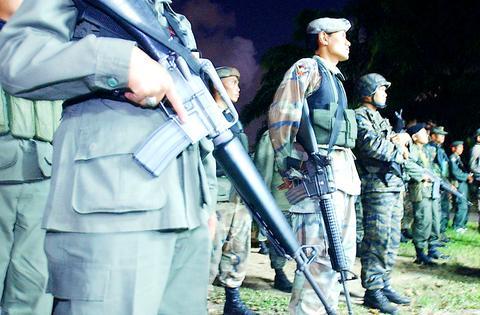After years of claiming that simmering violence in its Muslim south was simple banditry, Thailand is now coming to grips with a scourge that has long plagued other parts of Southeast Asia: terrorism.
A frighteningly coordinated guerrilla assault on an army camp that left four soldiers dead has shaken this mainly Buddhist country.

PHOTO: AP
Thailand's new security adviser General Kitti Rattanachaya yesterday blamed Sunday's attack on the local separatist group, Mujahideen Pattani, with help from outsiders, possibly the Kampulan Mujahideen Malaysia.
Analysts say that militant organization is tied to the regional terror network Jemaah Islamiyah, that is in turn linked to al-Qaeda.
"I believe these groups are certainly linked. They might give moral, ideological or tactical support to each other. These groups know each other well; they were comrades-in-arms in Afghanistan,'' he said.
Sunday night's mayhem started with a ring of fire when 21 schools in a 10km radius around an army camp were set ablaze simultaneously.
Using the arson as a diversion, a gang drove brazenly into the unprepared army camp and pinned down baffled, sleepy troops with automatic weapons fire.
"It was just like in the movies," said Pornpich Phuntamdet Patanakullert, a local legislator.
Roads leading to the camp were blocked by felled trees, tires and nails to slow down reinforcements. The shooting stopped 20 minutes later when the attackers vanished into the night with more than 100 guns stolen from the armory.
Sunday's attack represents the biggest internal security challenge for Prime Minister Thaksin Shinawatra -- a valued ally in the US-led war on terror since his forces captured a top regional Muslim extremist suspect, Hambali, an al-Qaeda pointman and Jemmah Islamiyah commander, who had been hiding out in Thailand in August.
No one has claimed responsibility for Sunday's raid.
"It's difficult to identify the exact perpetrators but certainly these are violent Islamist groups," said Rohan Gunaratna, a terrorism expert and author of a book on al-Qaeda.
"The fact that they have taken weapons shows they will use the weapons against the Thais," he said in a telephone interview from Singapore.
While the government now says it believes that local Muslim separatists are to blame, Thaksin dismisses suggestions that they might be linked to "international terrorism" -- code words for Hambali's Jemaah Islamiyah or its parent group, al-Qaeda.
But some analysts disagree, citing reports that young Thai Muslims may have been trained abroad by Islamic extremists.
The violence has put the spotlight on the grievances of ethnic Malay Muslims in southern Thailand, who have long complained of poor treatment by the Buddhist-dominated government in Bangkok.
The deep south provinces of Pattani, Narathiwat, Yala and Satun are the only Muslim majority areas in Thailand.
The region was a hotbed of an Islamic separatist movement in the 1970s and 1980s. Most of the 20,000 Islamic fighters gave up arms after a 1987 government amnesty, but the unrest began brewing anew in December 2001 with hit-and-run attacks on police and army and bombings.

A fire caused by a burst gas pipe yesterday spread to several homes and sent a fireball soaring into the sky outside Malaysia’s largest city, injuring more than 100 people. The towering inferno near a gas station in Putra Heights outside Kuala Lumpur was visible for kilometers and lasted for several hours. It happened during a public holiday as Muslims, who are the majority in Malaysia, celebrate the second day of Eid al-Fitr. National oil company Petronas said the fire started at one of its gas pipelines at 8:10am and the affected pipeline was later isolated. Disaster management officials said shutting the

US Vice President J.D. Vance on Friday accused Denmark of not having done enough to protect Greenland, when he visited the strategically placed and resource-rich Danish territory coveted by US President Donald Trump. Vance made his comment during a trip to the Pituffik Space Base in northwestern Greenland, a visit viewed by Copenhagen and Nuuk as a provocation. “Our message to Denmark is very simple: You have not done a good job by the people of Greenland,” Vance told a news conference. “You have under-invested in the people of Greenland, and you have under-invested in the security architecture of this

Japan unveiled a plan on Thursday to evacuate around 120,000 residents and tourists from its southern islets near Taiwan within six days in the event of an “emergency”. The plan was put together as “the security situation surrounding our nation grows severe” and with an “emergency” in mind, the government’s crisis management office said. Exactly what that emergency might be was left unspecified in the plan but it envisages the evacuation of around 120,000 people in five Japanese islets close to Taiwan. China claims Taiwan as part of its territory and has stepped up military pressure in recent years, including

UNREST: The authorities in Turkey arrested 13 Turkish journalists in five days, deported a BBC correspondent and on Thursday arrested a reporter from Sweden Waving flags and chanting slogans, many hundreds of thousands of anti-government demonstrators on Saturday rallied in Istanbul, Turkey, in defence of democracy after the arrest of Istanbul Mayor Ekrem Imamoglu which sparked Turkey’s worst street unrest in more than a decade. Under a cloudless blue sky, vast crowds gathered in Maltepe on the Asian side of Turkey’s biggest city on the eve of the Eid al-Fitr celebration which started yesterday, marking the end of Ramadan. Ozgur Ozel, chairman of the main opposition Republican People’s Party (CHP), which organized the rally, said there were 2.2 million people in the crowd, but